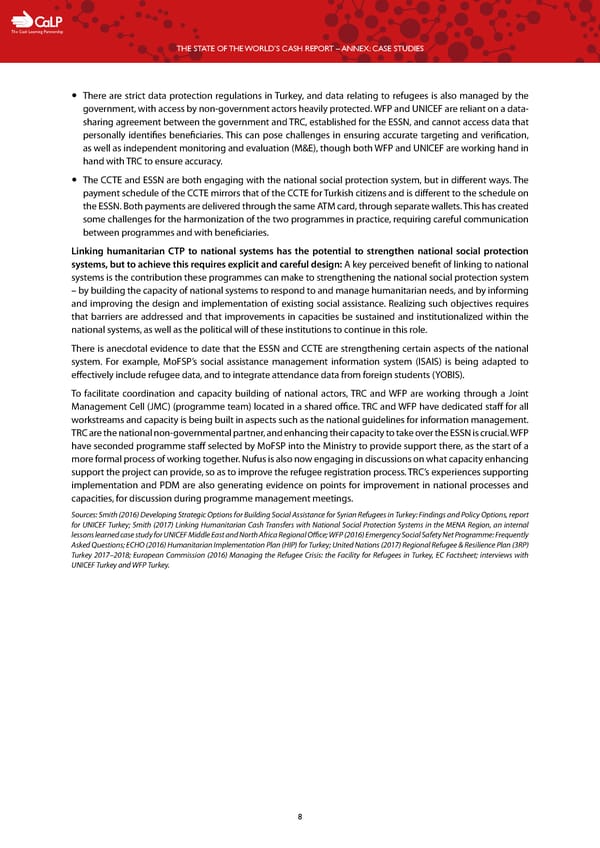C The Cash Learning Partnership THE STATE OF THE WORLD’S CASH REPORT – ANNEX: CASE STUDIES — There are strict data protection regulations in Turkey, and data relating to refugees is also managed by the government, with access by non-government actors heavily protected. WFP and UNICEF are reliant on a data- sharing agreement between the government and TRC, established for the ESSN, and cannot access data that personally identifies beneficiaries. This can pose challenges in ensuring accurate targeting and verification, as well as independent monitoring and evaluation (M&E), though both WFP and UNICEF are working hand in hand with TRC to ensure accuracy. — The CCTE and ESSN are both engaging with the national social protection system, but in different ways. The payment schedule of the CCTE mirrors that of the CCTE for Turkish citizens and is different to the schedule on the ESSN. Both payments are delivered through the same ATM card, through separate wallets. This has created some challenges for the harmonization of the two programmes in practice, requiring careful communication between programmes and with beneficiaries. Linking humanitarian CTP to national systems has the potential to strengthen national social protection systems, but to achieve this requires explicit and careful design: A key perceived benefit of linking to national systems is the contribution these programmes can make to strengthening the national social protection system – by building the capacity of national systems to respond to and manage humanitarian needs, and by informing and improving the design and implementation of existing social assistance. Realizing such objectives requires that barriers are addressed and that improvements in capacities be sustained and institutionalized within the national systems, as well as the political will of these institutions to continue in this role. There is anecdotal evidence to date that the ESSN and CCTE are strengthening certain aspects of the national system. For example, MoFSP’s social assistance management information system (ISAIS) is being adapted to effectively include refugee data, and to integrate attendance data from foreign students (YOBIS). To facilitate coordination and capacity building of national actors, TRC and WFP are working through a Joint Management Cell (JMC) (programme team) located in a shared office. TRC and WFP have dedicated staff for all workstreams and capacity is being built in aspects such as the national guidelines for information management. TRC are the national non-governmental partner, and enhancing their capacity to take over the ESSN is crucial. WFP have seconded programme staff selected by MoFSP into the Ministry to provide support there, as the start of a more formal process of working together. Nufus is also now engaging in discussions on what capacity enhancing support the project can provide, so as to improve the refugee registration process. TRC’s experiences supporting implementation and PDM are also generating evidence on points for improvement in national processes and capacities, for discussion during programme management meetings. Sources: Smith (2016) Developing Strategic Options for Building Social Assistance for Syrian Refugees in Turkey: Findings and Policy Options, report for UNICEF Turkey; Smith (2017) Linking Humanitarian Cash Transfers with National Social Protection Systems in the MENA Region, an internal lessons learned case study for UNICEF Middle East and North Africa Regional Office; WFP (2016) Emergency Social Safety Net Programme: Frequently Asked Questions; ECHO (2016) Humanitarian Implementation Plan (HIP) for Turkey; United Nations (2017) Regional Refugee & Resilience Plan (3RP) Turkey 2017–2018; European Commission (2016) Managing the Refugee Crisis: the Facility for Refugees in Turkey, EC Factsheet; interviews with UNICEF Turkey and WFP Turkey. 8
 The State of the World's Cash | Case Studies Page 9 Page 11
The State of the World's Cash | Case Studies Page 9 Page 11